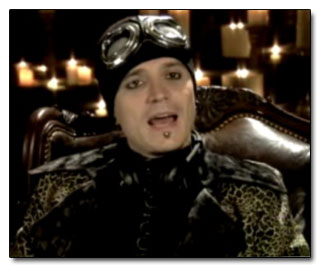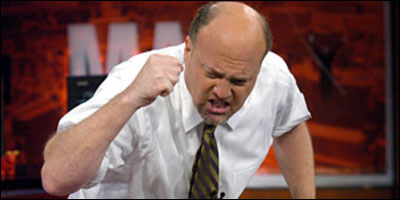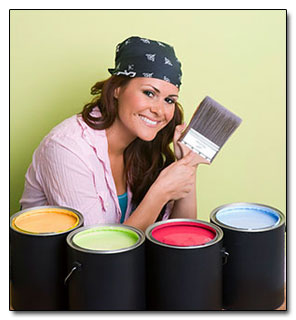The 5 Worst Sources of Advice on Television

Entertainment and good advice rarely cross paths. This is partly because most good advice--don't run with scissors, watch your money, don't bring a bong to a job interview--isn't fun to watch. No, it's far more fun to watch people flail and flounder than to succeed at life, and that's exactly what bad advice accommodates.
With that in mind, here are five of the most entertaining purveyors of awful advice to be found on television.
Mystery from VH1's The Pickup Artist

Mystery, the star of VH1's The Pickup Artist, has dedicated his career to teaching men how to seduce women through seminars and bootcamps that he hosts around the world. And like the other professions that exist exclusively within the conference rooms of the La Quinta Inn chain -- knife sales, pyramid schemes, sports memorabilia auctions, beauty pageant workshops for children - the fact that Mystery charges money for the advice he dispenses seemed more likely to send him to Hell than cable television.
Mystery promotes the concept of "peacocking" or wearing outrageous clothes to attract attention from girls, adhering to the "all attention is good attention" school of thought that most of us abandoned after we were no longer toddlers.

Vests. Ties. Fuzzy hat. What's missing? Oh, right. Women.
When Mystery walks into a nightclub dressed like a costume shop mannequin in Haight-Ashbury, he's not just saying "Hey, Look at Me!" - he's saying, "Hey, Look at Me: I'm a douchebag!" Mystery prides his outfits on their depth and sophistication, but it's precisely that depth that sells out his desperation, his wafer-thin personality and the fact that he's the one that's been looting the local Burlesque theater's prop room.

Yeah, the Amelia Earhart look sort of died with...Amelia Earhart.
Actually, you have to wonder how much Mystery himself buys into his own advice; he could be pulling everyone's leg when he tells men to paint their nails black and initiate conversations with women by insulting them. Think about it: These desperate lonely types watch his show, then boldly stride from their basements to attract chicks while wearing Richard Nixon masks and snow shoes. They embarrass themselves even further when they break the ice by asking a woman if her hair is real. They figure they still must not have it right, and that adds a premium to the special advice that Mystery hawks for a fee behind closed doors in the Sacramento Airport's EconoLodge business lounge.
Jim Cramer from CNBC's Mad Money

Jim Cramer enjoyed a long and, presumably, successful career on Wall Street as a hedge fund manager before thrusting himself in front of millions of viewers as host of CNBC's Mad Money, his daily stock-picking television train wreck. In the show he discusses the finer points of a handful of stocks by throwing furniture, jamming buttons on a sound board and generally emulating the physicality of an electro-shock therapy session.
Although the hedge fund industry is enshrouded in secrecy, it seems unlikely that it's populated by thousands of Jim Cramers. For one, an industry staffed by animated blowhards like Cramer would probably start generating more money from ticket sales than investment returns and convert itself into a white-collar circus.

This would be an awesome reality show.
Hedge fund managers, with millions of dollars riding on their investment positions and their compensation schemes tied to fund performance, are essentially in the business of dealing with pressure and we're assuming they don't deal with that pressure by flailing around the room and screeching out of their window.
Hey, maybe that's what happened: the pressure got to him. So when Jim Cramer prattles off stock suggestions on Mad Money by shooting buckshot at a dictionary and gauging which three letters took the most damage, maybe it should be interpreted less as "professional investment advice" and more "one man's personal descent into madness."

Or, more likely, the reason he left the high-flying world of hedge fund management to commit 30 minutes of road rage in front a camera every day is because he's not all that interested in picking stocks for a living. There's more glory in being a televised abrasive asshole than a mega-wealthy abrasive asshole - just ask Donald Trump.
Maury Povich from NBC's Maury

Bad advice isn't always the result of poor judgment; sometimes there's just no good advice to give. That's the position that Maury Povich, host of daytime talk show Maury, finds himself in when he masterfully confronts topics like: "Help! I don't know who my baby's father is!" or "My daughter is OUT OF CONTROL!" The guests on his show have made habitually bad decisions over the course of their lives - they're addicted to screwing up. Expecting them to go cold turkey from being morons is unrealistic.
There's little doubt that Maury genuinely wants to help his guests - it's obvious from the fact that he often invites them to appear on his show multiple times. But some situations defy advice -- how can you help someone whose every option in life is awful? Without a time machine, Maury Povich has no way of helping a person that has sex in exchange for cheeseburgers other than telling them to consider not doing that again this weekend.

"Well, I am just in way over my head, here."
And while Maury's advice to these people may be bad, at least it's advice. The key is to remember that the advice is specifically aimed at members of the unwitting travelling freak show, and not to you at home. With society having effectively turned its back on the "I tattooed my face to look like a lizard's" contingent, Maury Povich is there.

Maury loves you, Baby.
His job isn't to help you, it's to give America's outcasts a stern, disapproving head movement from atop the moral authority of a handsome turtleneck sweater. And he does it well.
Joey Greco from G4's Cheaters

Helping friends through a break-up is difficult. But helping complete strangers through a break-up is easy: you just film their loved ones cheating on them and show them the footage.
This simple formula has catapulted Joey Greco's Cheaters into godsend status among fraternity members and previously-scorned, single thirty-somethings. Each show ends with a (usually violent) confrontation between cheater and cheatee, during which Joey Greco takes the opportunity to brow-beat the accused into a frenzied, emotional meltdown.
And where advice is usually offered for the benefit of the recipient, in Joey Greco's case the advice - to have a cheating significant other followed and videotaped - is only given so that he can soak up the satisfaction of talking down to a red-handed cheater. On TV.

You can't tell, but that chair is on top of a giant pedestal, atop a high horse.
So instead of convincing the subjects of his show to talk through their issues with their significant others, Joey Greco organizes shock and awe breakups - confrontations so charged and emotional that they always end in either fist-fighting or sex.

The cheatee always walks away worse off, one more person to find that problem solving via basic cable reality show has left them sadly unfulfilled.
TLC's Flip This House

In the year 2056, a sociological presentation on the greed and short-sightedness that drove the financial crisis of 2008 will probably open with an episode of Flip That House. The show follows modern-day gold prospectors buying, renovating and selling homes with turnarounds of as little as 30 days.
The show generally features houses that were successfully flipped and sold for tens of thousands of dollars in profit. Crack dens, run-down shanties, doghouses - they're all converted into McMansions in the span of 30 minutes and sold for half-a-million dollars by a sharply-dressed real estate agent who thinks it was a great idea to install granite countertops.
Each episode follows the same basic plot progression: house is bought, then house is fixed, then massive bags full of money are trucked to local bank branch. But the people flipping the houses fit one of three profiles: the young go-getter eager to get her feet wet in the "real world"; the father-son duo who rekindle their relationship over the project; and the chipper, sensible newlyweds who are renovating the house as their honeymoon.

The advice these people dispense on the show is to follow their lead to El Dorado, the city of gold. But advice is only as good as the results it achieves, and it's more profitable now to flip burgers than houses. The fact is that house flipping most likely created more divorcees than millionaires, and each episode of Flip That House is probably directly responsible for 10-20 mortgage defaults from people trying to play along at home.

House-flipping is actually slightly more complicated than this.
Holy crap, we think we owe Joey Greco up there an apology.
For more crap your television would like you to swallow whole, check out 5 Cheap Tricks TV Shows Use to Keep You Watching. Or check out As Seen on TV: The 10 Most Laughably Misleading Ads.
And stop by Cracked.com's Top Picks to receive some great online advice from total strangers!